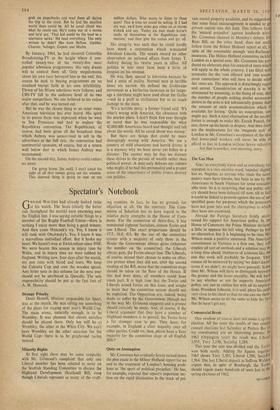Minority Rights
At first sight there may be some sympathy with Mr. thimond's complaint that only one Liberal member has been selected to serve on the Scottish Standing Committee to discuss the Highland Development (Scotland) Bill, even though Liberals represent so many of the croft- ing counties. In fact, he has no grounds for objection at all. On the contrary. The Com- mittee of Selection has to have regard to the relative party strengths in the House of Com- mons. For the committee of thirty-five, it has nominated eighteen Socialists, sixteen Tories and one Liberal. The exact proportions should be 17.7, 16.8, 0.5. By the use of the committee system with a majority of only three in the House the Government always gains (whatever the number on the committee), the Liberals always gain, the Tories always lose. The Liberals, of course, missed their chance to make an effec- tive protest when they did not, after the second reading of the Bill, move that the committee stage should be taken on the floor of the House. If this bad been done, all members could have taken part. It is high time that the Tories and Liberals joined forces on this issue, and sought to insist that the committee system should not be exploited. The Opposition are, indeed, being made to suffer by the Government (though not in the way Mr. Grimond suggests) and a protest should certainly be made. And, of course, if the Liberal argument that they have a number of Highland members is to prevail, the Tories have a far stronger case to put. They have, for example, in England a clear majority over all other parties. Could we, then, pleas'e have a Tory majority for the committee stage of all English Bills?














































 Previous page
Previous page